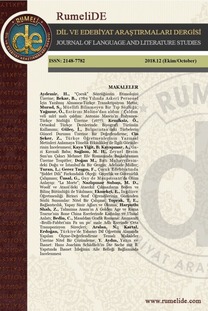Emily Dickinson, Elizabeth Bishop ve Mary Ruefle'ın şiirlerinde iyileştirici alanlar
Son yıllarda yapılan çalışmalar, şiir dünyasında farklı yüzyıllarda ürünler veren Emily Dickinson, Elizabeth Bishop ve Mary Ruefle'ın, feminist yazarlar olarak daha ciddi olarak düşünülmesi ve değerlendirilmesi gerektiğini öne sürmektedir. Bu sebeple bu çalışma, yazarların ürünü olan şiirleri feminist perspektifle inceleyecektir. Ayrıca, bu çalışma ilgili şiirlerin, özellikle kadın okuyucular tarafından okunduğunda, erkek egemen ve cinsiyetçi düşünce dünyasında, kadın olarak kendi deneyimlerini yansıtabilecekleri ve bunu yaparken de duygusal olarak iyileşebilme imkanı bulabilecekleri bir okuma yaklaşımı ortaya koyacaktır. Bu okuyucular, bu şiirlerin içerisinde kendi hikayelerini bulabilecek ve kendi deneyimlerinin yansımalarını keşfedeceklerdir. Bu okuma, yaşanan deneyimde, okuyucunun kendini tanıması ve bir anlamda kendi öz-değerini de farketmesi olacaktır. Bu çalışma, feminist perspektifle analiz edilen şiirlerin içerik ve form üzerinden okunması deneyimini ortaya koymasının yanı sıra, eski şiirsel kavramlar olan kendini keşif, bellek, doğa ve yüce kavramlarına da yeni bir lensle yaklaşıp inceleyecektir.
Spaces of restorative healing in the poetry of Emily Dickinson, Elizabeth Bishop, and Mary Ruefle
Recent scholarship suggests that Emily Dickinson, Elizabeth Bishop, and Mary Ruefle—three giants in the world of poetry who flourished in different centuries—should be more seriously considered as feminist writers that they previously have been. The present work makes a specific case to that effect by examining one poem of each, and argues that the poems offer and inscribe spaces in which readers (especially women readers) might reflect on their own experiences as women and, in doing so, encounter possibilities for emotional healing in a world still dominated by sexist or patriarchal modes of thought. Such readers are able to recognize themselves and their own stories inside the work. Healing becomes possible when that self-recognition is transformed into a sense of self-worth. In this sense, these three poets might be re-evaluated in terms of their contributions to feminist thinking owing to how they created their poems (form), and not merely what the poems say (content). Taken together, form and content in Dickinson’s “I dwell in Possibility,” Bishop’s “In the Waiting Room,” and Ruefle’s “Keeping It Simple” offer spaces for restorative healing. The analyses here are augmented by new looks at old poetic concepts, including self-discovery, memory, nature, and the sublime.
___
- Bishop, E. (1979). “In the Waiting Room.” The complete poems 1927-1979. Farrar, Straus & Giroux.
- https://poets.org/poem/waiting-room......................................................
- Dennis, H.M. (2000). "Bishop and the Negative Sublime." In Kelly Lionel (ed.) Poetry and the sense of panic: critical essays on Elizabeth Bishop and John Ashbery. Rodopi.
- https://www.modernamericanpoetry.org/criticism/helen-m-dennis-waiting-room.
- Dickinson, E. (1999). “I dwell in Possibility” (466). The poems of Emily Dickinson. Harvard University
- Press. https://www.poetryfoundation.org/poems/52197/i-dwell-in-possibility-466.
- Garland, M. (2020). “The Poetry of Memory.” Iowa Summer Writing Festival, June 2020.
- https://iowasummerwritingfestival.org/poetry-memory-0.
- Heilmann, A. (1995). Feminist resistance, the artist and “A Room of One's Own.” New Woman Fiction, Women's Writing, 2:3, 291-308.
- Hirshfield, J. (2018). Poetry, permeability, and healing. American Poets. https://poets.org/text/poetry-permeability-and-healing.
- Juhasz, S. (1983). The undiscovered continent: Emily Dickinson and the space of the mind. Indiana
- University Press. https://www.modernamericanpoetry.org/criticism/suzanne-juhasz-657-i-dwell-possibility.
- Levertov, D. (1964). “The Secret.” O taste and see: new poems. New Directions.
- https://www.poetryfoundation.org/poems/48725/the-secret-56d22a326e5a8.
- Ruefle, M. (1982). “Keeping It Simple.” Memling’s veil. University of Alabama Press.
- https://www.poetryfoundation.org/poems/53253/keeping-it-simple.
- ---. (2012). Madness, rack, & honey. Wave Books........................................................
- Žižek, S. (1993). Tarrying with the negative: Kant, Hegel, and the critique of ideology. Duke University Press.
- ISSN: 2148-7782
- Yayın Aralığı: Yılda 6 Sayı
- Başlangıç: 2014
- Yayıncı: Yakup YILMAZ
